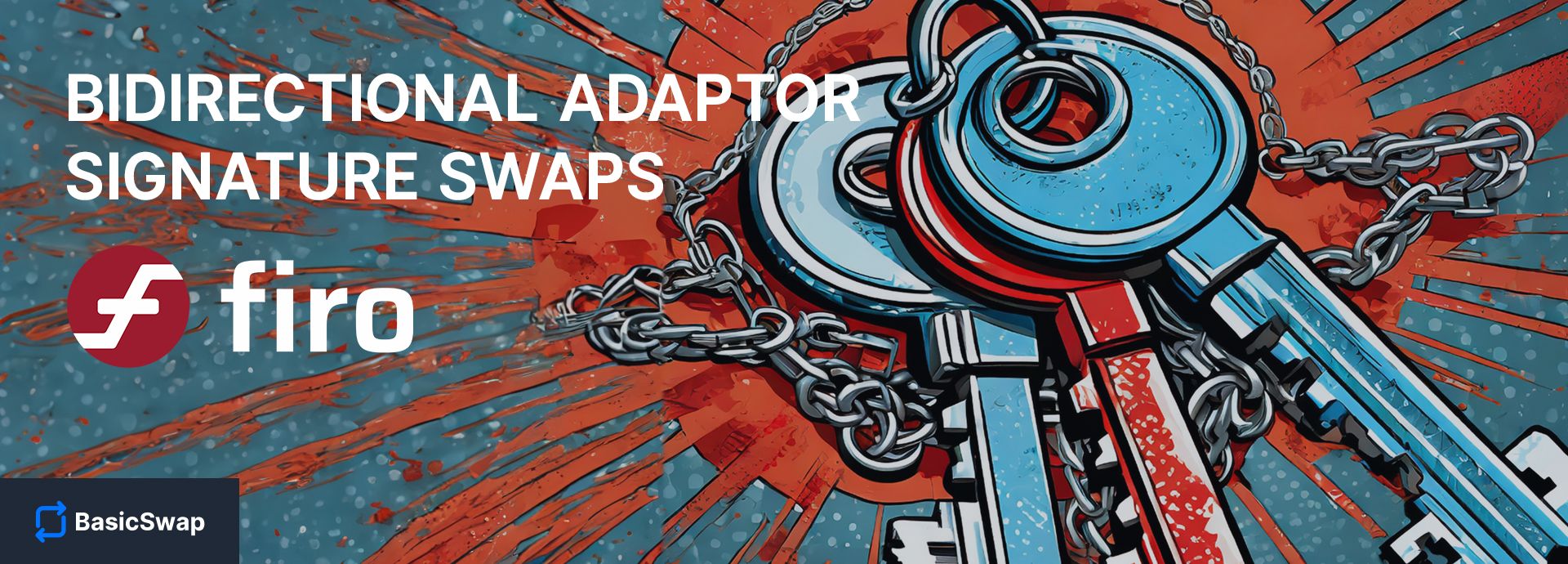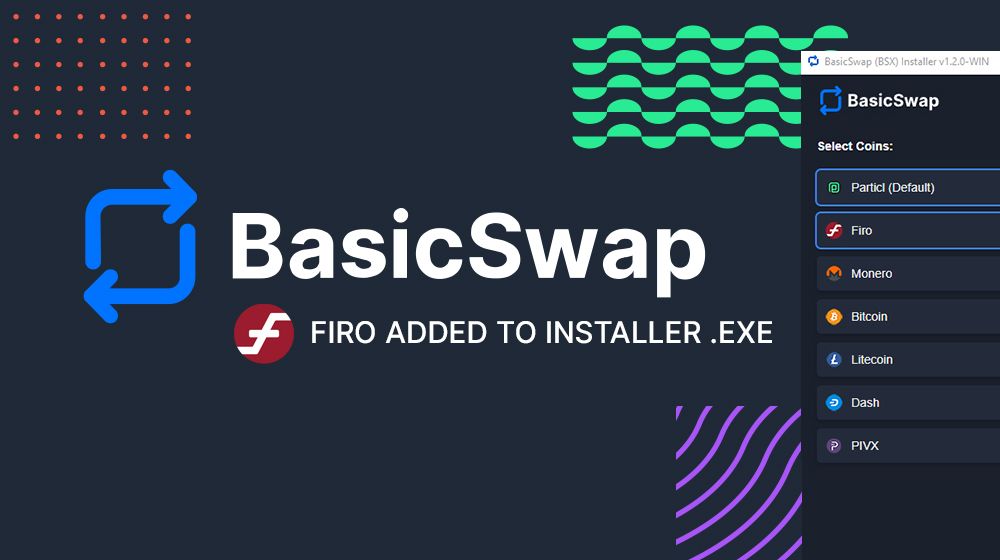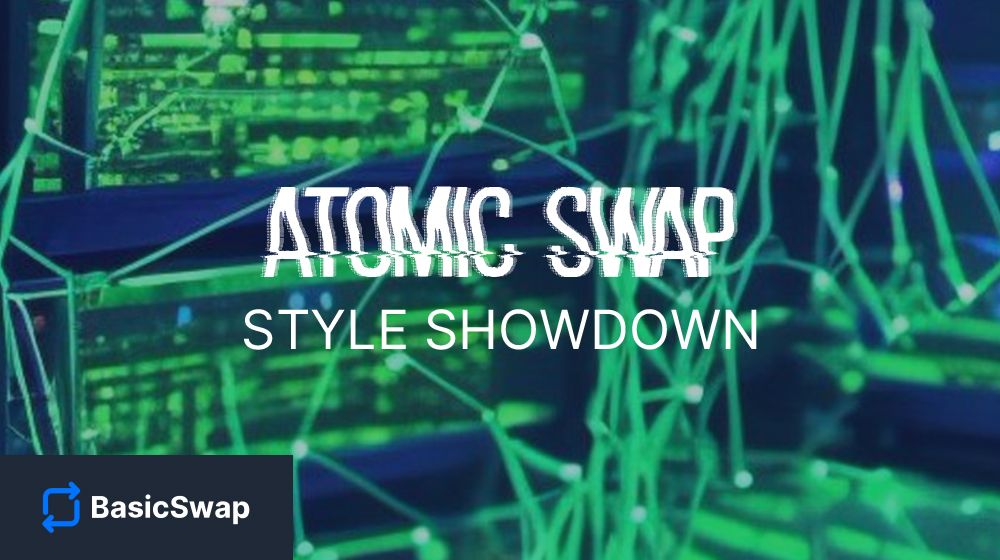
Last week, we announced that Firo has been added to BasicSwap's installation wizard. This addition makes it easy for users to set up the DEX with Firo using the installer's graphical interface.

But we have even more good news about Firo to share today! As mentioned in our recent weekly development updates, we've been working on improving Firo's integration into the DEX. Today, we're thrilled to announce that Firo is now fully compatible with bidirectional adaptor signature swaps!
This marks a significant milestone in our ongoing efforts to improve and expand privacy-first technologies across different chains.
What are Bidirectional Adaptor Signature Atomic Swaps?

Adaptor signature atomic swaps are an innovative kind of atomic swap, initially conceptualized for Monero to facilitate its atomic swapping with Bitcoin (read more about it here). This new type was necessary because Monero lacks programmable outputs, a key feature needed for the kind of smart contract required to complete its part in the swap process.
Adaptor signature atomic swaps use what's known as "semi-scriptless scripts." This approach allows for a secure swap when only one party has programmable outputs (specifically, the other party needs to have SegWit). This breakthrough made Monero <> Bitcoin atomic swaps possible, representing a major step forward in the development of decentralized, privacy-first financial technologies.
However, the utility of adaptor signatures extends beyond just enabling Monero compatibility.
Anonymous Atomic Swaps
One of the key advantages of adaptor signature-based swaps is their inherent anonymity. To appreciate this benefit, it's crucial to understand what causes the lack of privacy in standard Hashed TimeLock Contract (HTLC) based atomic swaps.
Why Standard Atomic Swaps are Terrible for Your Privacy
Standard atomic swaps, while innovative, have significant privacy drawbacks. The core issue arises from the use of an identical hash that is recorded on each involved blockchain, typically at very close timestamps. Although the hash itself doesn't directly disclose any information when singled out, it poses a serious privacy threat when cross-referenced against blocks from other blockchains. Indeed, blockchain analysis firms can easily detect this identical hash on two different blockchains, allowing them to infer that the owners of the two corresponding addresses have conducted a swap together.
The situation worsens when the swap involves two transparent coins, such as Bitcoin (BTC) and Litecoin (LTC), for example. In such cases, the transaction amounts and the addresses of the participants are fully visible on the blockchain, essentially revealing all useful information to passive observers. This level of transparency is akin to smart-contract swaps on platforms like Ethereum, where the specific details of every swap, including the amounts and involved parties, are openly visible to anyone.
Such visibility is a stark contrast to the privacy expectations many users have when dealing with cryptocurrencies, especially when trading outside of centralized exchanges. It highlights the need for more privacy-preserving solutions, especially for those who value anonymity and confidentiality in their transactions. This is why adaptor signature swaps are so relevant!
Swapping Anonymously Using Adaptor Signature Swaps
Adaptor signature swaps address the privacy issue inherent in standard HTLC atomic swaps. When conducting a swap using this newer method, there isn't a matching hash recorded on both blockchains involved in the transaction. This means the swap-related data remains exclusive to the two participating parties, effectively shielding it from external observation.
This confidentiality ensures that neither passive nor active blockchain tracing techniques can deduce that transactions on two different blockchains are connected. Although one side of the swap — the programmable side, such as Bitcoin in a BTC <> XMR swap — will still exhibit a multi-signature transaction on its blockchain, this transaction won't contain any identifiable, traceable data, or even hints that this is specifically a swap transaction. As a result, it becomes impossible for anyone to link this transaction to another one on a different blockchain.
Can it be Further Improved?
In the case of coins paired with Bitcoin and Particl, yes. As part of our ongoing development for BasicSwap, we're looking forward to integrating Taproot functionalities into our swap processes. This integration will begin once the final component of Taproot, known as Tapscripts, is released by the Bitcoin development team.
Taproot is set to significantly enhance transaction privacy and fungibility. It achieves this by aggregating multiple signatures in a transaction into a single one, making the transaction appear typical. Currently, a multi-signature transaction on Bitcoin might still be perceived as non-standard, even though it doesn't reveal extra information to an outside observer. However, once Taproot is fully integrated into BasicSwap, such transactions will resemble any other regular transaction on the blockchain.
This update will be a game-changer in ensuring swaps are not just anonymous, but also seamlessly blend in with the regular transaction "noise" on the blockchain. It's a crucial step towards achieving the goal of making swaps completely anonymous and fungible.
Automated Market Making on BasicSwap? Yes!
While BasicSwap provides advanced functionality, it is still an early piece of software and its liquidity is nascent.
That's why we've prepared two video tutorials that will help you setup BasicSwap on a cloud server and automatically provide liquidity to the order book via its companion automated market making script.
Setup BasicSwap on a VPS
Setting up BasicSwap on a cloud instance is extremely useful because it won't require you to keep your computer on at all time and won't cost you storage space on your personal computer.
While there is a cost associated with hosting a VPS, our second video, which shows how to run automated market making on BasicSwap, may help in offsetting the costs via any potential trading profits.
Automated Market Making Script
This second video tutorial shows you how to deploy BasicSwap's companion automated market making script. This allows you to provide liquidity on the order book in a completely automated manner, ensuring that your offers are republished when they expire.
What's more, it also allows you to peg your rates to the current market prices (via API price fetching) and add a markup on top of that market rate, netting you profits when people pick up your offers.
Combined with a cloud instance of BasicSwap, this makes running an automated BasicSwap node a breeze once the initial setup is complete. You can simply launch your server, deploy the market making script, and earn profits on your provided liquidity with very minimal manual inputs required.
How to Swap
Of course, nothing stops you from picking offers from other swappers if you see great opportunities. In that case, the tutorial linked below will teach you how to go through all the steps required.
In a world increasingly marked by restrictions, censorship, and centralization, embracing decentralized and privacy-first platforms like BasicSwap DEX and Firo is crucial for reclaiming our digital sovereignty. Each individual's decision to use these platforms plays a significant role in advancing these technologies and fostering their wider adoption for the greater good.
If you are reading this, we want to express our gratitude for your support and for participating in the open-source, privacy-first revolution. Whether your interest lies in BasicSwap, Firo, Particl, or any other similar project, your involvement is a valuable contribution to this movement. Thank you for being a part of this journey towards a more secure, private, and decentralized digital future.
The Open-Source Revolution
We're on a mission to create a private, independent, and pro-liberty digital economy that is fair and open to all. Learn more about what we do at any of the following links.
Be a part of the movement and join us in the fight for our freedoms by meeting the community and spreading the word far and wide!
Discord Telegram Element / Matrix
Learn more about Particl with these in-depth resources.
Website BasicSwap DEX Academy Wiki
Follow the link below to get a list of all other useful Particl-related links you may find helpful.
